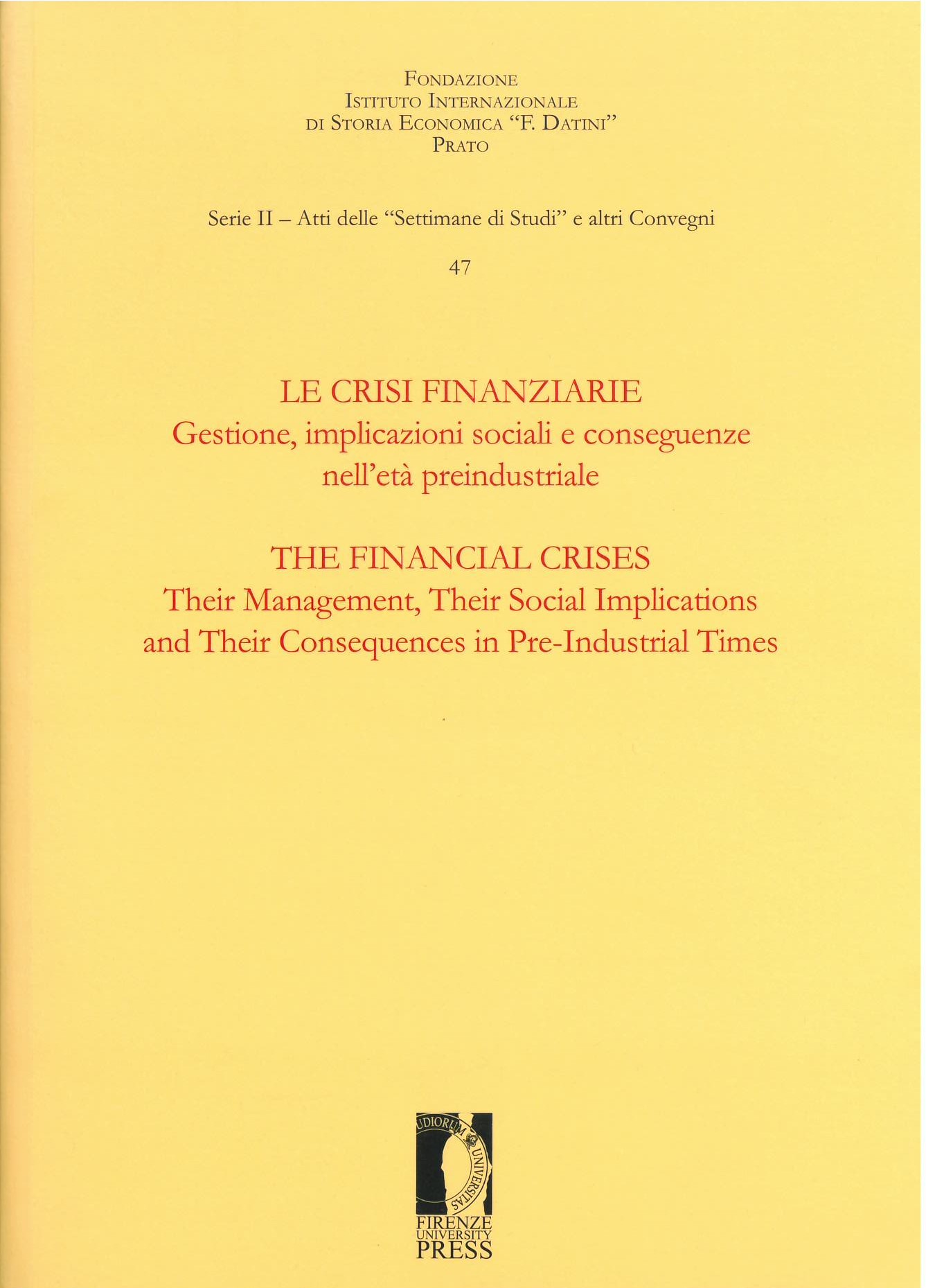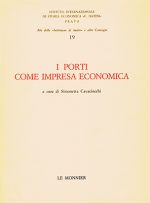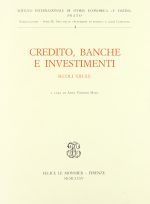Marco CATTINI (Milano Bocconi), Le crisi finanziarie: gestione, implicazioni sociali e conseguenze nell’età preindustriale, p. 1
ANALISI DELLE CRISI FINANZIARIE / ANALYSING FINANCIAL CRISES
Philip Robertson RÖSSNER, The Crisis of the Reformation (1517) : Monetary and Economic Dimensions of a Change in Paradigm, p. 19
Maurizio PEGRARI, Parigi 1720. Una città e la sua crisi, p. 49
Alessandra BULGARELLI, Far fronte alla crisi della finanza locale: riforme contabili e nuovo patto fiscale tra governo e comunità locali nel Regno di Napoli (XVII secolo),
Maurizio PEGRARI, Parigi 1720. Una città e la sua crisi, p. 49
Alessandra BULGARELLI, Far fronte alla crisi della finanza locale: riforme contabili e nuovo patto fiscale tra governo e comunità locali nel Regno di Napoli (XVII secolo),
p. 77
José Ignacio FORTEA PÉREZ, Hacienda real y haciendas locales en la crisis del siglo XVII: el ejemplo de Castilla, p. 109
Gilbert LARGUIER, Exposition et vulnérabilité différenciées des communautés locales face aux crises financières. L’exemple du Roussillon et du Languedoc (Catalogne – France méridionale) XVIIe-XVIIIe siècles, p. 133
Emanuele C. COLOMBO, Marco DOTTI, Usi del debito locale e cultura della rendita. Casi dalla Lombardia spagnola (17°-18° secoli), p. 153
José Ignacio FORTEA PÉREZ, Hacienda real y haciendas locales en la crisis del siglo XVII: el ejemplo de Castilla, p. 109
Gilbert LARGUIER, Exposition et vulnérabilité différenciées des communautés locales face aux crises financières. L’exemple du Roussillon et du Languedoc (Catalogne – France méridionale) XVIIe-XVIIIe siècles, p. 133
Emanuele C. COLOMBO, Marco DOTTI, Usi del debito locale e cultura della rendita. Casi dalla Lombardia spagnola (17°-18° secoli), p. 153
LA GESTIONE DELLE CRISI / CRISIS MANAGEMENT
Albert ESTRADA RIUS, Federico PIGOZZO, Helmut RIZZOLLI, Strategie monetarie a confronto durante la grande crisi europea dell’argento (metà XIV secolo): Italia, Tirolo e Corona d’Aragona, p. 181
Pere ORTI GOST, Pere VERDÉS PIJUAN, The Crisis of Public Finances in the Towns of Late Medieval Catalonia (1350-1500), p. 199
Alan STAHL, The Mint of Venice in the face of the Great Bullion Famine, p. 223
Matteo Di Tullio, Davide MAFFI, Mario RIZZO, Il fardello della guerra. Governo della finanza pubblica e crisi finanziarie nello Stato di Milano fra centri e periferie (secc. XV-XVII), p. 239
Pere ORTI GOST, Pere VERDÉS PIJUAN, The Crisis of Public Finances in the Towns of Late Medieval Catalonia (1350-1500), p. 199
Alan STAHL, The Mint of Venice in the face of the Great Bullion Famine, p. 223
Matteo Di Tullio, Davide MAFFI, Mario RIZZO, Il fardello della guerra. Governo della finanza pubblica e crisi finanziarie nello Stato di Milano fra centri e periferie (secc. XV-XVII), p. 239
IL RUOLO DEI (RE)ATTORI / THE ROLE OF THE (RE)ACTORS
David KUSMAN, Jean-Luc DEMEULEMEESTER, Near-Default to Debt Restructuring: the Inventive Methods of the Duke of Brabant and His Council around 1313-1320 for the Salvation of the Princely Finances, p. 263
Elena Maria GARCÍA GUERRA, Giuseppe DE LUCA, Decadencia y desventura de un negocio en crisis: la banca castellana a finales del siglo XVI y su próspero contrapunto milanés, p. 283
Elena Maria GARCÍA GUERRA, Giuseppe DE LUCA, Decadencia y desventura de un negocio en crisis: la banca castellana a finales del siglo XVI y su próspero contrapunto milanés, p. 283
Koji YAMAMOTO, “I Invest, You Speculate, They Gamble”: James Brydges the First Duke of Chandos during the South Sea Bubble, p. 325
Claudio MARSILIO, “Sono tempi che corrono accidenti non prevedibili”. Come gli hombres de negocios genovesi (re)agirono alle insolvenze della corona spagnola (1621-1648) tra speculazioni finanziarie e mercato del credito e dei metalli preziosi,
Claudio MARSILIO, “Sono tempi che corrono accidenti non prevedibili”. Come gli hombres de negocios genovesi (re)agirono alle insolvenze della corona spagnola (1621-1648) tra speculazioni finanziarie e mercato del credito e dei metalli preziosi,
p. 359
Giovanni CECCARELLI, Operare nelle bolle. Comportamenti e strategie nei mercati assicurativi della prima età moderna, p. 377
Mathieu SCHERMAN, Observations sur les conséquences financières d’une crise politique : l’expulsion des Florentins de Venise vue de la comptabilité Salviati (1451-1454), p. 395
Katia BEGUIN, Paris in Financial Turmoil (1648-1652) and the Birth of a New Way of Borrowing for French Monarchy, p. 411
Giovanni CECCARELLI, Operare nelle bolle. Comportamenti e strategie nei mercati assicurativi della prima età moderna, p. 377
Mathieu SCHERMAN, Observations sur les conséquences financières d’une crise politique : l’expulsion des Florentins de Venise vue de la comptabilité Salviati (1451-1454), p. 395
Katia BEGUIN, Paris in Financial Turmoil (1648-1652) and the Birth of a New Way of Borrowing for French Monarchy, p. 411
IL RUOLO DELLE ISTITUZIONI / THE ROLE OF INSTITUTIONS
Markus DENZEL, The Role of Institutions in Financial Crises: Fairs – Public Banks – Stock Exchanges (13th to 18th Century), p. 427
Krzysztof BORODA, Piotr GUZOWSKI, From King’s Finance to Public Finance. Different Strategies of Fighting Financial Crisis in the Kingdom of Poland under Jagiellonian Rule (1386-1572), p. 451
Isabella CECCHINI, Instabilità finanziaria e intervento pubblico: Venezia 1600-1630,
Krzysztof BORODA, Piotr GUZOWSKI, From King’s Finance to Public Finance. Different Strategies of Fighting Financial Crisis in the Kingdom of Poland under Jagiellonian Rule (1386-1572), p. 451
Isabella CECCHINI, Instabilità finanziaria e intervento pubblico: Venezia 1600-1630,
p. 471
Antal SZÁNTAY, “Vitam et sanguinem, sed avenam non“. Habsburg State Finances and Hungary in the 18th Century, p. 489
Antal SZÁNTAY, “Vitam et sanguinem, sed avenam non“. Habsburg State Finances and Hungary in the 18th Century, p. 489
CONSIDERAZIONI CONCLUSIVE / CLOSING REMARKS
Larry NEAL, Final Considerations: The Role of Financial Systems in the Crises of Pre-Modern Europe, p. 507
Abstracts, p. 533




